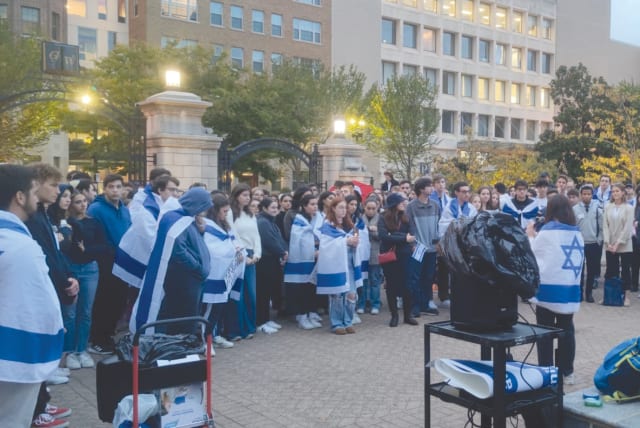Campus Israel Fellows are on reserve duty for the Jewish people - opinion

In the face of the grief and uncertainty surrounding the consequences of the war, Israel Fellows have utilized their resilience.
Six days into the war between Israel and Hamas, I faced a jarring moment of inner conflict. On the one hand, my fellow service members needed my help. On the other hand, while I was summoned to the frontline of the war, my presence would be missed on another crucial position for Israel: North American college campuses.
In fact, feeling torn between these two commitments has recently been a common conundrum for many of the Jewish Agency Israel Fellows – the young Israeli emissaries who are supporting Jewish and non-Jewish college students in today’s hostile and challenging reality.
Israel Fellows are, in essence, on reserve duty for the Jewish people at this time of surging antisemitism and anti-Israel sentiments. They maintain an authentic and engaging Israeli presence on campus, and connect students with Judaism and Israel. They are substituting education for ignorance, and they create a safe space for people to be openly and publicly Jewish. Thus, they give students a chance to develop a personal relationship with Israelis and learn what Israel is all about.
Various data show unmistakably that this is a defining moment on campus. According to a recent Harvard-Harris poll, 51% of Americans ages 18-24 believe that the long-term answer to the Israeli-Palestinian conflict is for “Israel to be ended and given to Hamas and the Palestinians.”
A survey from the Anti-Defamation League and Hillel International found that 67% of Jewish students felt physically safe on campus prior to October 7, compared to 46% today. Only 33% now feel emotionally safe, down from 66% before the war. Those numbers tell an unbelievable story: Most Jewish students on US campuses feel unsafe in their daily lives.
In the face of the grief and uncertainty surrounding the consequences of the war, Israel Fellows have utilized their resilience. They have responded – just as they did in more normal times – to these rising threats by stepping in as a valuable resource to students who are looking to learn about, engage with, and support Israel, not only on their campuses but even on the ground in the Jewish state.
In New York, Israel Fellows enlisted dozens of students who chose to forgo their semester break and travel to Israel. There, they dedicated their time to volunteering with evacuees from the Gaza border communities, at hospitals, and in agriculture. On many campuses, Israel Fellows invited and hosted families of hostages who were kidnapped on October 7. This includes a campus in North Carolina, where 100 students, graduates, and faculty members attended a powerful and emotional event.
The ongoing effort also goes beyond preaching to the choir when it comes to cultivating connections, as they build bridges between Jewish and non-Jewish students through Israel-related education and dialogue. In Vermont, an Israel Fellow recently led a skiing weekend for both Jewish and non-Jewish student leaders, fostering honest and open discussions on topics such as antisemitism, Judaism, and community.
Relationship-building is the key to changing opinions
WE UNDERSTAND that relationship-building is the key to both supporting Jewish students and changing the broader conversation around Israel on campus. Opinions do not change based on the regurgitation of narratives and statistics, but rather from people getting to know each other through meeting face to face.
Once you form a relationship, you cannot possibly hate someone you love. Israel Fellows, too, focuses on building relationships with students as the foundation of their work – as a priority that is even more important than the Israel-related educational programs and experiences that they organize on campus. Of course, the current war will trigger increased hatred of “the other.” But at the same time, Israel Fellows are witnessing Jewish and non-Jewish students alike coming out of the woodwork and showing interest in understanding Israel for the first time.
It is not an easy path, and the numbers show that we have a very long way before students can feel safe while publicly being Zionists. However, Israel Fellows have been planting the seeds by relationship-building efforts to ensure the long-term vision of the program’s fruition: a long-lasting relationship with Israel.
In these ways, Israel Fellows are demonstrating that the Jewish state is strengthened not only by the reserves, who have literally enlisted for the war, but also by the reserves for the Jewish people who are spreading the light at Israel’s darkest hour on campus.
The writer is the coordinator of the Jewish Agency Campus Israel Fellows.
Jerusalem Post Store
`; document.getElementById("linkPremium").innerHTML = cont; var divWithLink = document.getElementById("premium-link"); if (divWithLink !== null && divWithLink !== 'undefined') { divWithLink.style.border = "solid 1px #cb0f3e"; divWithLink.style.textAlign = "center"; divWithLink.style.marginBottom = "15px"; divWithLink.style.marginTop = "15px"; divWithLink.style.width = "100%"; divWithLink.style.backgroundColor = "#122952"; divWithLink.style.color = "#ffffff"; divWithLink.style.lineHeight = "1.5"; } } (function (v, i) { });

